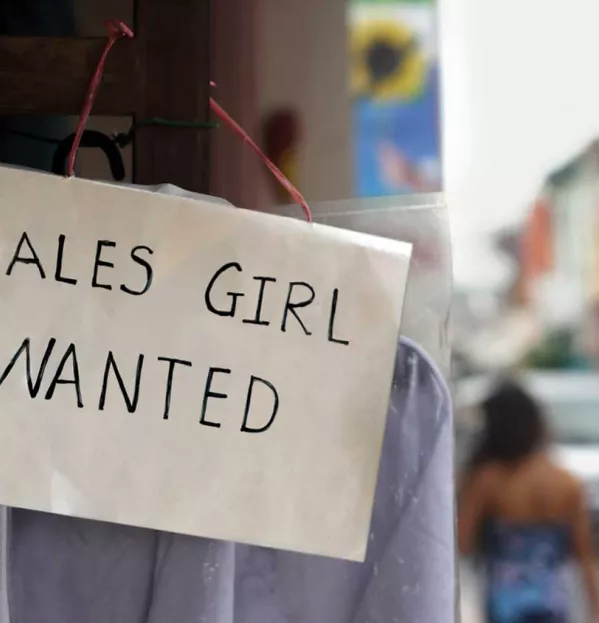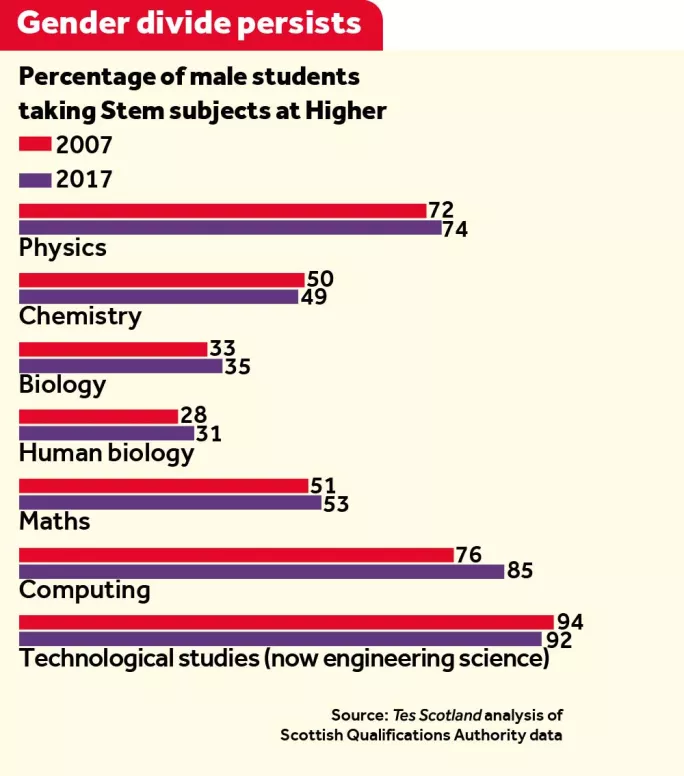Treat sexist language like racism, teachers urged

Scottish teachers are being told to deal with sexist language in the same way they would racist or homophobic speech, in a bid to address gender bias in schools.
Educators are also being urged to confront their own sexist stereotyping, as part of an effort to wipe out beliefs - held even among very young children - that “girls are inherently quiet, compliant and nurturing, while boys are boisterous, confident and should avoid anything traditionally considered feminine”, according to new guidance for schools.
Meanwhile, a Tes Scotland analysis of Scottish Qualifications Authority (SQA) data shows that the gender divide in uptake has barely shifted in many subjects - and that in some cases it has widened.
Schools inspectorate and curriculum body Education Scotland is asking teachers to stop and think before making comments in class that assume a child’s mother is the one who helps them with their homework, or asking loaded questions such as: “Is anyone’s father an engineer?” Such bias reinforces the idea that women “cannot be engineers” and “do the bulk of childcare”, narrowing opportunities for girls in later life, according to a new “action guide” for schools, produced by Education Scotland, Skills Development Scotland and the Institute of Physics.

Schools are also being warned against relying on one-off events to tackle gender bias, such as an annual “girls into science” intervention. These efforts “do not have a lasting impact” and need to be “part of a wider strategy”, the guidance says.
Instead, the document - published after a three-year pilot in which primaries, secondaries and nurseries in six school clusters were supported to tackle gender stereotyping - recommends schools adopt five-year plans and identify staff to be “gender champions”.
However, a review of the pilot of Improving Gender Balance Scotland (IGBS) - which the government now plans to roll out across Scotland - says some teachers are in denial that gender imbalance is even an issue at all, and that this presents a major barrier.
Shift ‘entrenched perceptions’
“The main challenge is the scale of change required to shift entrenched culture and perceptions,” the report states. “There was and remains a resistance and denial that there is a gender imbalance or stereotyping issue by some individuals within organisations/schools.”
Talat Yaqoob, director of Equate Scotland, which campaigns for a diverse Stem sector, says that “tackling gender stereotypes in the classroom is crucial to creating gender equality across the education pipeline”. Girls’ interest in Stem at a young age is on a par with that of boys, Yaqoob adds, and teachers should be “well informed on “institutionalised inequality and occupational segregation”.
However, the review also found that 97 per cent of respondents who took part in the IGBS programme - including teachers, heads and nursery staff - reported feeling more confident in their ability to tackle gender imbalance issues.
The Tes Scotland analysis of SQA data reinforces the need for action to address the gender imbalance in certain subjects. It shows that the proportion of female pupils opting to take Highers in Stem subjects has barely shifted in a decade. And where there has been significant movement, it has been for the worse.
In 2007, just over three-quarters of Higher computing science candidates were male, but by last year the figure had risen to 85 per cent.
Meanwhile, girls account for an overwhelming majority of Higher entries in childcare and development (95 per cent) and care (92 per cent), which are qualifications typically associated with lower-paid professions.
The hope is that the rollout of IGBS, led by Education Scotland, will transform perceptions and challenge unconscious assumptions about who does what kind of job, with the initiative eventually reaching every school cluster in Scotland by 2022.
Heather Earnshaw, a former physics teacher, left the classroom three years ago to become the lead project officer for IGBS at the Institute of Physics. She became interested in the role after growing increasingly aware that, by Advanced Higher, very few girls were still enrolled in her classes.
Earnshaw acknowledges that gender stereotypes are all-pervading. But she argues that schools can chip away at the problem. Small tweaks applied consistently have the potential to make a big difference over time, she insists.
Duncan Harvie, principal teacher of science at Woodmill High in Fife, which took part in the pilot, echoes this sentiment. “Little actions all the time make a difference - being careful with your language, how you address classes, how you group pupils,” he says.
Harvie adds that because he and his colleagues had to make only small changes, they were not too onerous (see box, opposite); the most difficult aspect was admitting there was an issue in the first place. “As a staff group, we found it quite challenging,” he says. “We had to question our practice. The hardest part is recognising there’s a problem and choosing to do something about it.”
You need a Tes subscription to read this article
Subscribe now to read this article and get other subscriber-only content:
- Unlimited access to all Tes magazine content
- Exclusive subscriber-only stories
- Award-winning email newsletters
Already a subscriber? Log in
You need a subscription to read this article
Subscribe now to read this article and get other subscriber-only content, including:
- Unlimited access to all Tes magazine content
- Exclusive subscriber-only stories
- Award-winning email newsletters